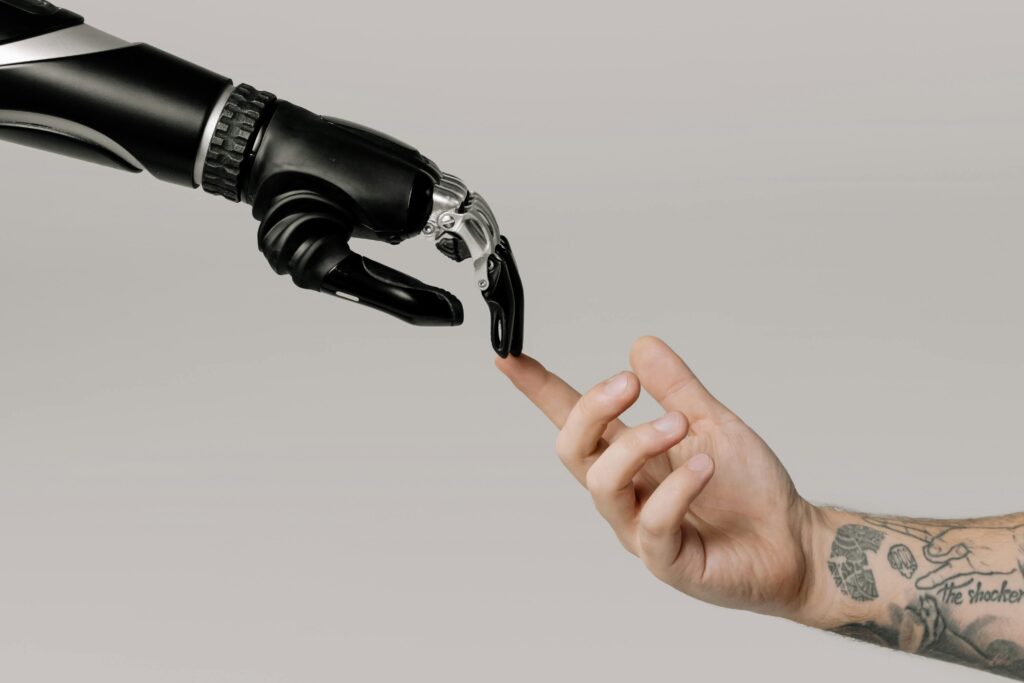There is no doubt that Generative Artificial Intelligence (AI) is the most transformative technology of today’s age. It can be compared with the Steam Engine of the fourth industrial revolution. But it has raised questions about the future of work.
In this article, we will cover the data about use of AI at work, and what skills to invest in now to remain competitive in this new age.
The bottom line is AI is going to fundamentally impact the future of work. Instead of fearing AI, it is better to consider AI as an augmentation or complementary technology that enhances our capabilities. But we need to adapt and upskill ourselves starting now to remain competitive. Start your journey to understand what the future is and how you can play a role in it.
AI won’t replace humans – but humans with AI will replace humans without AI.

Credit: Cottonbro Studio, Pexels
Table of Contents
What Is Generative Artificial Intelligence (AI)
2023 can be considered Generative Artificial intelligence’s breakout year. Generative artificial intelligence (AI) describes algorithms that can be used to create new content, including audio, code, images, text, simulations, and videos.
Generative AI recently gained new attention with the release of text generators like ChatGPT, image generators like MidJourney and Dall-E, and the latest release of video generator, Sora. These prompted Hollywood strikes as the industry as creative industries tried to navigate the threat of these technologies.
These tools represent a new reality for workers. It is inevitable. Artificial Intelligence is going to revolutionize the future of work.
Story That Data Tells Us About Use of AI At Work

Credit: Geralt, Pixabay
Pew Research Center surveys show that 19% or U.S. workers are employed in jobs that are the most exposed to AI in 2022.
Data tells us the following:

More recently, a report by investment bank Goldman Sachs said Artificial Intelligence could replace the equivalent of 300 million full-time jobs. They estimate that roughly two-thirds of US occupations are exposed to some degree of automation by AI and a quarter to as much as half of their workload could be replaced.
Goldman Sachs’ report said most jobs and industries are only partially exposed to automation and are thus more likely to be complemented rather than substituted by AI, by boosting productivity, increasing output, and creating new job opportunities.
There is no need to worry just yet if you are concerned about the future of your career owing to the advancements in AI. To future-proof your career, there are a few practical actions that you can take.
TIP:
All too often, as we talk about AI and Generative AI, we jump to the conclusion of job loss. However, it’s much more a story of augmentation.
The huge potential of AI technology is how it can help augment professions and help free up time so it can be repurposed.
Benefits of Artificial Intelligence
The future of work is set to be revolutionized, driven by Artificial Intelligence. These are some of the benefits that AI can offer to our day-to-day work:
Humans can perform their jobs more efficiently and effectively by leveraging advanced technologies like AI, while machines can automate routine tasks and provide valuable data analysis to support decision-making.
This synergy allows employees to focus on tasks that require human ingenuity, such as complex problem-solving and creativity, while the machines handle the more routine and repetitive tasks.
Building New Work Skills Now to Future-Proof Your Career
Artificial Intelligence is the first technology that goes after white collar jobs. Half life of skills used to be 30 years. However with Artificial Intelligence, the half life of skills is 7 years. This means that in an average career, you will need to change your skills 5 times.
As per World Economic Forum Future of Jobs Report, in the next five years 23% of global jobs will change due to industry transformation, including through artificial intelligence and other text, image and voice processing technologies. Upskilling and reskilling people will be critical right away to remain competitive in today’s digital world.

Credit: Geralt, Pixabay
The top five skills you can invest in now to protect our jobs are as follows:
- Creative thinking: Creative thinking is the ability to come up with unique and innovative solutions to problems. It is about seeing around the corners by exploring the problem that others do not notice. What is interesting is that you can bring ideas from one industry to another to create a disruptive transferable solution. Below are few examples of some cross industry innovation or copy, adapt, paste approach:
- Owen Maclaren, a retired aeronautical engineer and test pilot, developed the first foldable lightweight baby stroller to save his daughter the struggle with her cumbersome stroller when getting in and out of airplanes. He drew his inspiration from the retractable landing gear on large aircraft.
- MacDonald’s drive-through fast food service is based on the principles of Formula 1 pit stop layouts.
- YoSushi and other ‘take what you want’ sushi bars use the principle of the airport baggage carousel system.
- BMW’s iDrive system allows the driver to select and navigate various entertainment and other functions and uses the same principle as video game controllers.
2. Analytical Thinking: For analytical thinkers, the future has never been brighter. Analytical thinking is the process of breaking down complex information into components and understanding how they are interconnected. This includes the following:
- Data analysis
- Research
- Critical thinking
- Communication
- Problem-solving
- Visualization
- Creativity
3. Technological Literacy: This skill is related to developing a growth mindset and be open to continuously learn about the latest digital technologies to enhance work efficiency. This skill will be a formidable differentiator in our careers by fostering an innovative mindset, offering a competitive edge, and increasing productivity and efficiency.
These are some examples of how you can develop technological literacy:
- Remain curious about working more efficiently.
- Learn about email efficiency.
- Research any communication and collaboration tools you use at work, such as MS Teams, etc to figure out how to use it more efficiently.
- Utilize To do Apps, such as To Doist, Evernote, etc.
- Become an early adopter of new technology at work.
- Research the features and capabilities and start to develop your expertise in them.
- Use firm training resources, and external resources to develop expertise in new technologies.
- Learn about new technologies being developed even if they are not being used at your work. This includes new AI technologies, like ChatGPT, etc.
4. Curiosity and Lifelong Learning: Cultivate a growth mindset by constantly learning new skills and improving existing skills. This can be your leverage to protect you from the future where most jobs are automated. The more unique your skill set is, the harder you will be to replace.
These are few examples of how to become a lifelong learner:
- Read Books: Always be reading. Learn something new every day.
- Be Curious: Be curious about things and learn how they work. Learn new things. Learn about new trends and research them. Take notes.
- Develop a Growth Mindset: Learn to handle challenges and keep retrying by changing approaches to solve the problems. Seek constructive criticism. Learn from your failures. Face the things that you fear as that’s where the greatest potential of advancement lies.
5. Resiliency, Flexibility and Agility: Anticipate and think ahead of how AI is going to revolutionize your industry – think 10, 20, 30 years ahead to keep up with technological advancement.
These are few examples of how to become resilient, flexible and agile in your career:
- Do not stay complacent.
- Think like a general about what changes can be expected in your industry and stay ahead of the rest by learning these skills to remain competitive.
- Research industry trends and learn about the future prospects of your industry.
- Be agile to adapt to changes.
- Take on new responsibilities, and pivot to new career paths when they open up.
Conclusion
Artificial Intelligence is the new digital frontier that is going to revolutionize the future of work. AI is going to create a digital disruption but also create unique opportunities for growth. Instead of fearing technological advancements like AI, we need to think them as augmentation of our capabilities. The possibilities are endless.
However, to remain competitive in this digital age, we need to start investing in upskilling ourselves now. By learning these skills, you will stay ahead of the curve and remain competitive in your career.
